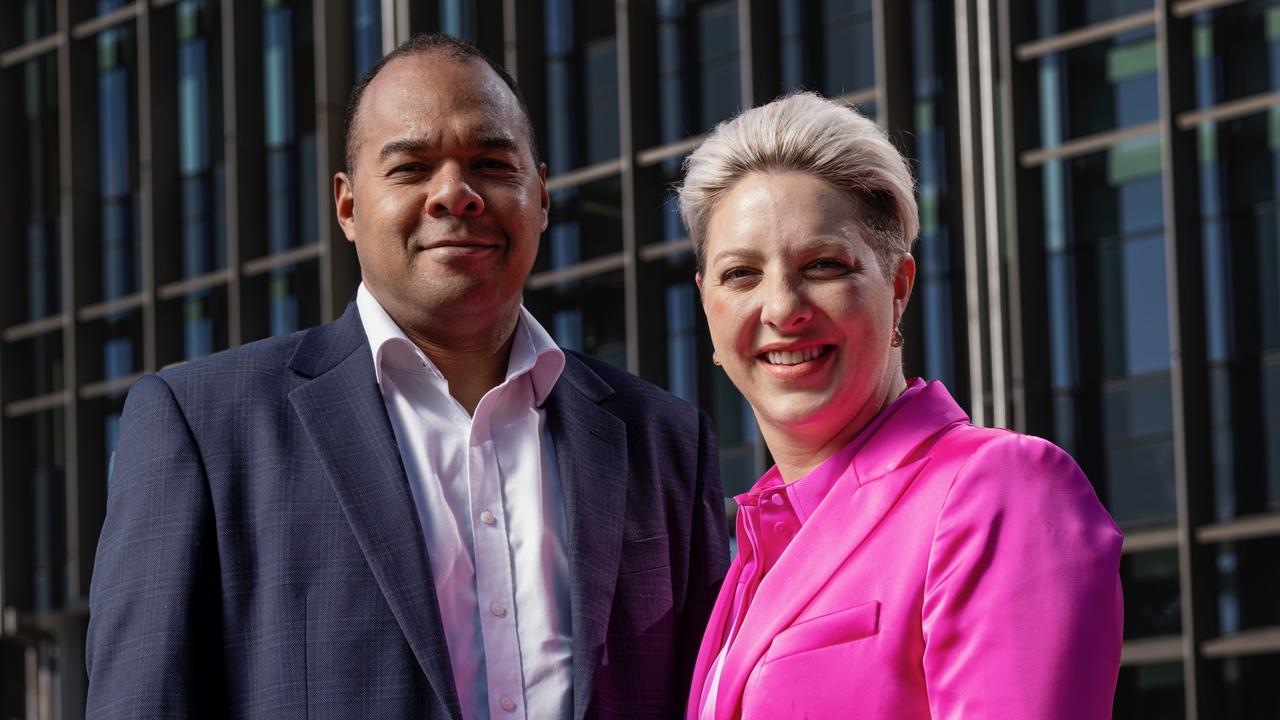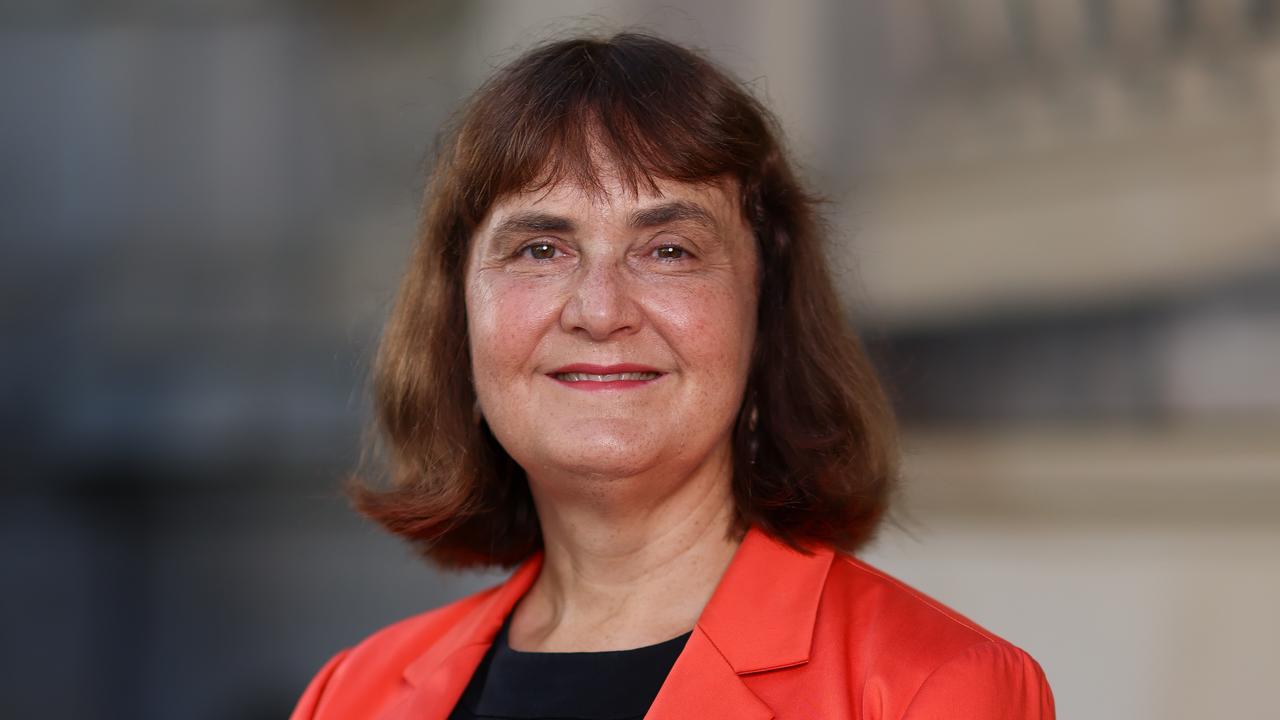‘In the 26 years I’ve been a journalist, this story stood out’: The extraordinary man Frances Whiting couldn’t forget
I've interviewed hundreds, perhaps thousands of people, many famous or highly successful but the story of this Brisbane man will stay with me forever, writes Frances Whiting.
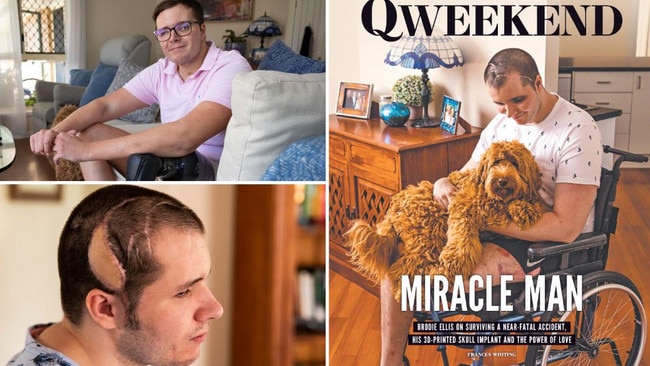
QWeekend
Don't miss out on the headlines from QWeekend. Followed categories will be added to My News.
Some stories stay with you. Some people stay with you.
In the 26 years I’ve been a journalist, I’ve interviewed hundreds, perhaps thousands, of people and every now and again someone stands out.
Not because they’re famous, or infamous, or successful, although I’ve interviewed plenty of those people too.
Sometimes, someone stands out because they get under your professional skin a little bit.
Or a lot.
This column was originally published in November 2023 and has been resurfaced as part of The Courier-Mail summer columnists series.
Make you smile. Laugh out loud. Make you think about the sort of person you want to be.
Make you want to stay long after the interview is officially over, to talk about how The Pixies’ Here Comes Your Man just might be the perfect pop song.
For me, one of those people is Brodie Ellis.
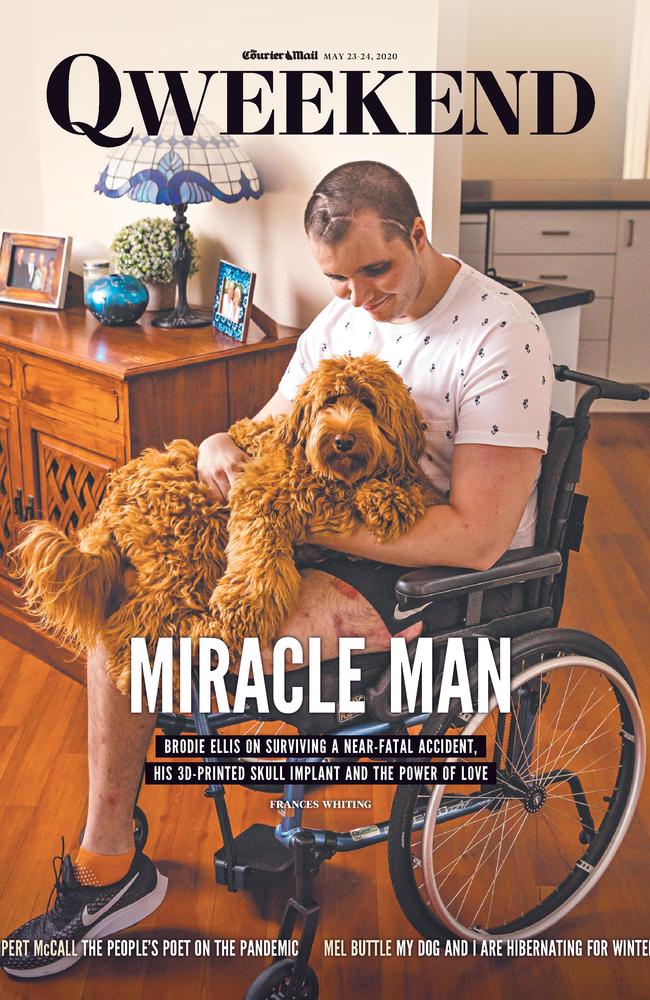
I first met Brodie in May, 2020.
He was 26 years old, in hospital, and as he said at the time, “I’ve had a shocker, Fran.”
He was not exaggerating.
Following a catastrophic motorcycle accident in Vietnam, Brodie had been an inpatient at Brisbane’s Princess Alexandra Hospital for 14 long months.
He had no recollection of the accident, no recall of being flown to Brisbane, and only patches of memory of his life before the accident and his peripatetic, student adventures through India, Thailand, Cambodia and Vietnam.
That was his “before”, but Brodie was now living in the “after”.
And the “after” was a place where he’d hovered between life and death, lost all of his vision in one eye, and half of it in the other, lost his hearing in one ear, underwent an above knee amputation of his left leg, and two cranioplasties where a team of surgeons and specialists attached 3D implants into his gaping skull.
He had a series of prosthetics fitted before he found one that actually did fit.
He also had an acquired brain injury.
It was, his mother Bernie told me with – I came to learn – the entire Ellis family’s gift for understatement, “a lot”.
But when I met Brodie, rolling towards me in his wheelchair, his smile was wide, and his eyes were dancing beneath his bandaged head.
“G’day, Fran,” he said.
“So you’ve come to hear my story. How much time have you got?”
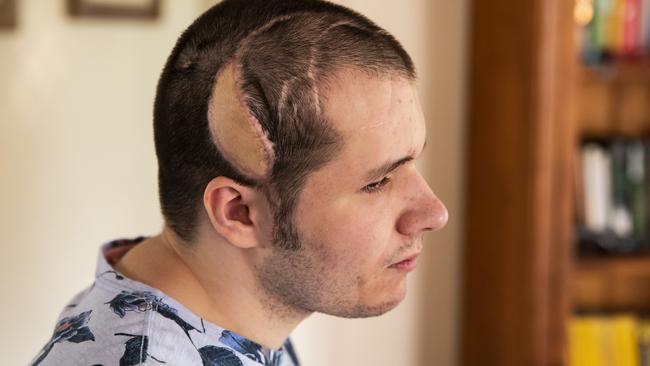
All the time in the world as it turned out.
Time to listen to how a young man faces a very different life to the one he had mapped out, time for his surgeon Dr Michael Wagels to say of Brodie, “I haven’t met too many like him.”
Time to hear nurses, doctors, baristas and cleaners at the hospital call out, “Hey Brodie”, “How you doing, Brodie?”, “Hit me up for a coffee later, Brodie” as he rolled on by.
“They know me here,” Brodie grinned.
Brodie Ellis. Having a shocker. Lucky to be alive. And exactly the same as he used to be in all the ways that count. Loving. Loved. Cheeky. Irreverent. Smart. Hilarious. Quick-witted.
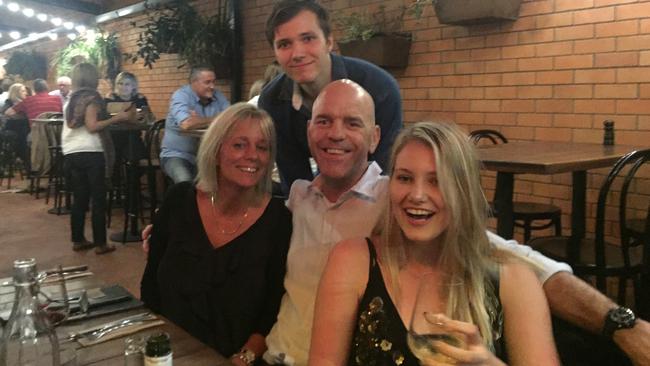
And, on the day I met him, finally discharged from hospital and on his way home. He had some boxes to tick when he got there.
Watching footy with his stepfather Eric, bantering with his younger sister Sabrina and kicking back with Bernie at the kitchen table, telling her about his day.
But there were far bigger boxes to tick, too.
Learn to walk again. Go back to university. Get a job. Get fit. Get a life, Brodie said.
Since then, we’ve chatted on the phone a few times, exchanged some texts and emails, and nearly attended a Pixies concert together until Covid thwarted those plans.
Now, three years after we met and he told me he knew he had “a long way to go”, I’m walking up the drive of his Cannon Hill home in Brisbane’s southside, to see just how far he’s come.
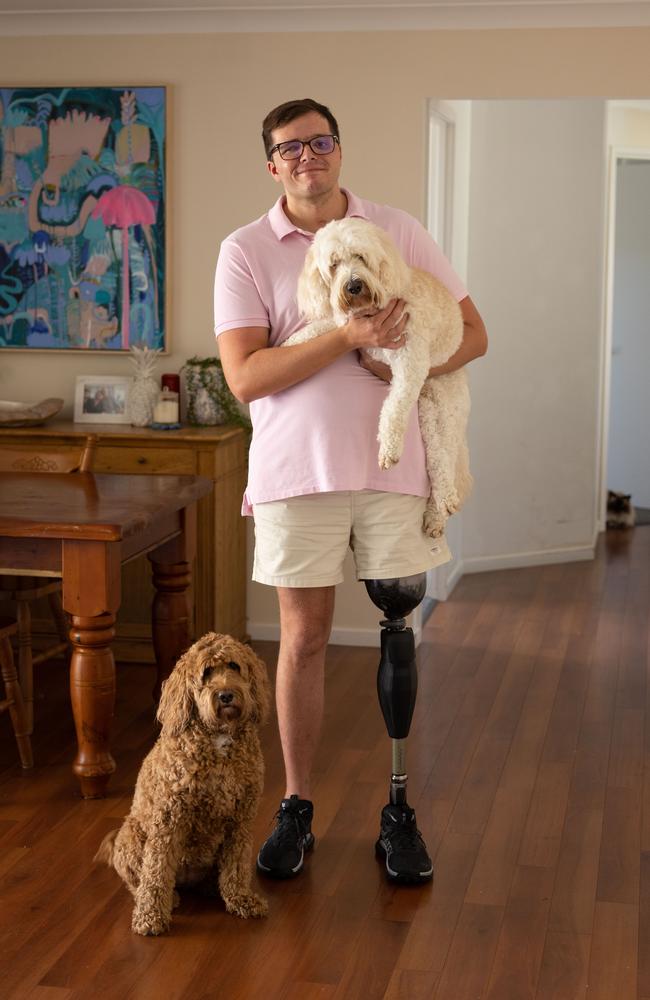
“Hello, it’s good to see you,” Brodie, now 28, same big grin, same dancing eyes, says, walking towards me on his prosthetic leg, a large ball of fur in his arms.
“This is Ziggy,’’ he says.
And these days, it’s rare to see Brodie without Ziggy the labradoodle by his side.
Unless he’s at uni. Or at work. Or the gym. Or thrashing through the salty waters of the Pacific, competing in an open water ocean swim.
Because within minutes of sitting down with Brodie, it becomes clear he hasn’t just ticked all the boxes he wanted to, he’s added a few new ones.
In June this year, he competed in the 3km Ironman Green Island Open Water swim, and earlier this year also competed in two equally gruelling open water swims in Noosa. For each race, he was tethered to another competitor.
“The fitness part is easy, the vision part is hard,’’ Brodie says.
“If I wasn’t connected to someone else, I’d be crashing off course. So we tie a tether around my leg and another one to my waist, and then to the person I’m swimming with, so they can make sure I stay on course.
“I did the first one with my sister Sabrina, and my friend Ewen Larsen and I swam Green Island. I started swimming at the end of my first year out of hospital because it was the best kind of cardio I could engage in.
At first it was just me training at the Yeronga pool, but then a great man called Trent Patten from Red Dog Triathlon Training offered to do a session with me for free each week, and then I started training with his squad too.”
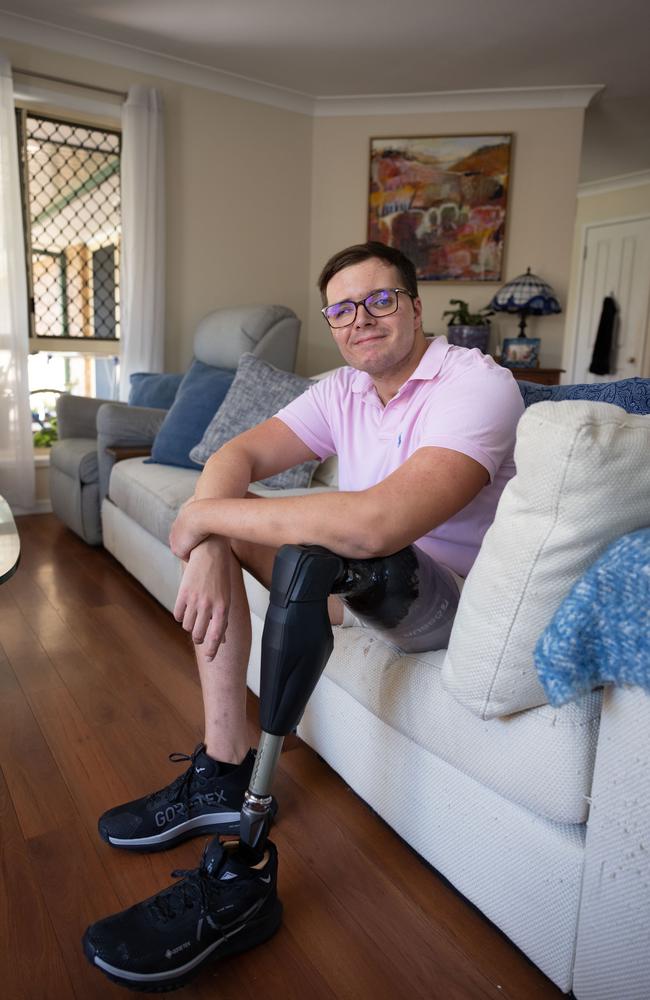
Brodie currently trains with Patten, and does an additional three to four sessions in the pool by himself each week, “which is good because I’m working on my tan as well”.
He also trains three times a week with exercise physiologist and now good mate Aaron Whitecross at The Movement Standard fitness centre in Milton.
And when he is not at the pool or the gym, he is studying for his business degree at the University of Queensland, majoring in financial planning and business – and keeping up a grade-point average of just below 6.
He also has a job, working as a business support officer for a virtual business incubator called enabled.vip.
“It’s for Australians with a disability, helping them connect with business expertise, resources, events and to an online community,” Brodie explains.
“I really love it, I really enjoy helping other people.”
But first, before he did all of that, before he learnt to walk again, return to uni, get a job, and get a dog, Brodie Ellis had to learn how to help himself.
“The first year I came home was pretty hard, to be honest,” Brodie says.
“I guess one of the big things was that in hospital everything is done for you. So I didn’t know how things like making a cup of tea were going to be much more difficult.
“The hardest part by far was my prosthetic. When I first got home, the pain using it was intense, I couldn’t walk on it, it was agony.”
It was eventually discovered that the source of Brodie’s pain was a neuroma (a benign tumour of nerve tissue) in his upper leg, probably caused by one of his many operations.
Getting it cut out, he says, was a game changer. As was working with the team from Spinal Life at Woolloongabba, an organisation which provides specialist care to people with spinal injuries.
“It was pretty hard, and I had some bad days, but I’ve learnt a few things. I have to keep projecting forward to the good things that are going to come. And I do that by finding something to look forward to, and then slowly working towards making it happen.
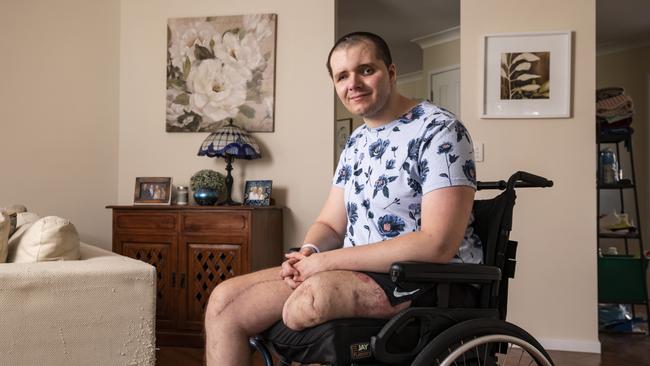
“I can’t change the cards that were dealt to me, I’ve just got to make the most of the ones I have. I think the first year was me just getting used to the idea of things being different for me. And then it was, ‘Well, okay, let’s get on with it then. Let’s do it.’” Brodie smiles.
“And then things got better.”
How much better? Enough for his mum Bernie Ellis to return to work after a year of staying home with her son. Enough, she says, to let him go. Enough to let him fall. Which happens sometimes.
“So my prosthetic is the Genium X3model, it’s like the best you can get,” Brodie says.
“It is a computerised leg, and it has a fall prevention mechanism in it. Which is excellent, because it has kicked in for me at uni sometimes.”
Which, Bernie says, smiling, she didn’t know about.
“I didn’t realise Brodie was using it to go to uni by himself. He was not getting the support workers to go with him. Instead he was getting them to drop him off there, and then accessing his classes by himself. The first I heard of it was when he said, ‘My fall mechanism kicked in at uni today’ and I said, ‘I beg your pardon?’”
They laugh together, easily, Bernie and his mum. They always have.
“Bernie is my superhero,” Brodie says. “She just never gives up.”
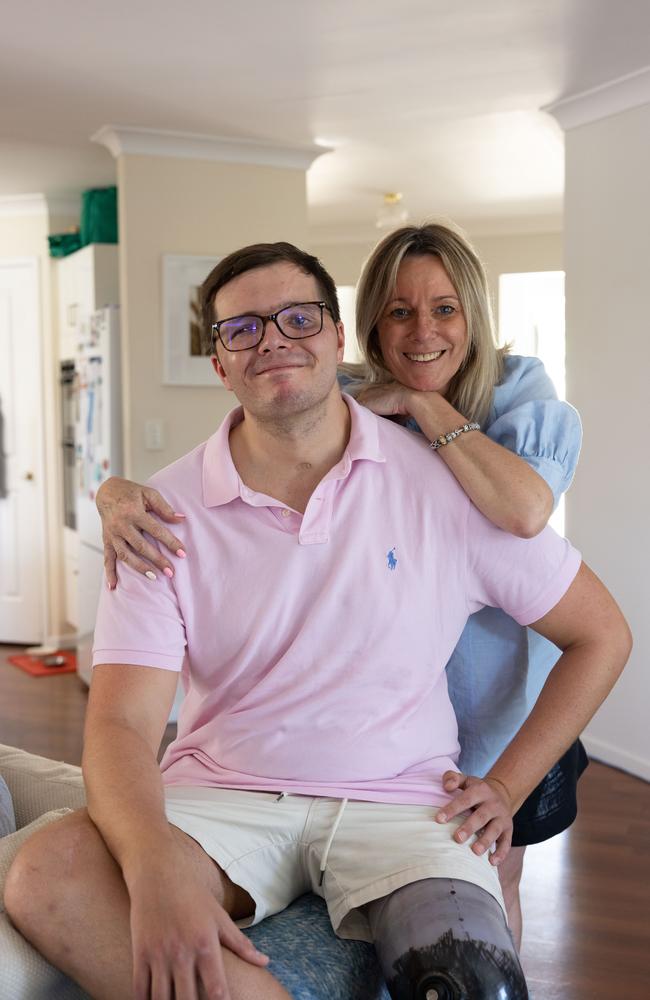
From the moment she picked up the phone in Cannon Hill to talk to her son in an induced coma in Vietnam – “I just kept telling him how much we loved him and that he had to hold on” – Bernie has been determined to minimise the impact of Brodie’s acquired brain injury.
Aware of the importance of neuroplasticity to brain health, she “never stopped talking” to him. It began with her reading to him in hospital – “Where was this story set?”, “What did they think was so funny?” – and, since then, his progress, his medical team says, has been more than they could have hoped for, or predicted.
“I’ve got some pretty gnarly statistics for you,” Brodie says.
“For my particular brain injury there was only a three per cent chance I would be functioning at all, of being able to talk, or think, or remember anyone, or anything, so when I hear that statistic, I think, yes, I’ve tried my best to help myself, but there’s got to be a degree of luck in there, and a whole lot of people helping me.”
Brodie’s right. There’s a tribe of people helping him, including his Men’s Walk and Talk group.
Every Sunday, about 10 blokes gather together to shoot the breeze and “sort it all out”, Brodie grins.
The men who started that group – among them, Conrad Leisemann, Jeff Kruger, Mitch Rowing and James Lewis – love Brodie, and he loves them right back, crediting them with much of his mental recovery.
“They’ve really helped me, and I’m really keen to help other people in return,” he says.
For the past few months, Brodie has been talking to a 19-year-old, above-knee amputee.
The young man who lost his lower leg in a climbing accident is in pain, angry, frustrated and grieving the life he once had. Brodie says he “gets it completely”.
“People always say they understand, and they really don’t because they can’t. But I can. I can tell him about the times I’ve lost my temper or have felt really down on myself. I can also tell him that it gets better, and that at some point you have to accept that your life as you knew it is over, but that doesn’t mean the end of you. It’s just the beginning of a different you.”
Brodie Ellis. Loving. Loved. Cheeky. Irreverent. Smart. Hilarious. Quick-witted. Beautiful.




